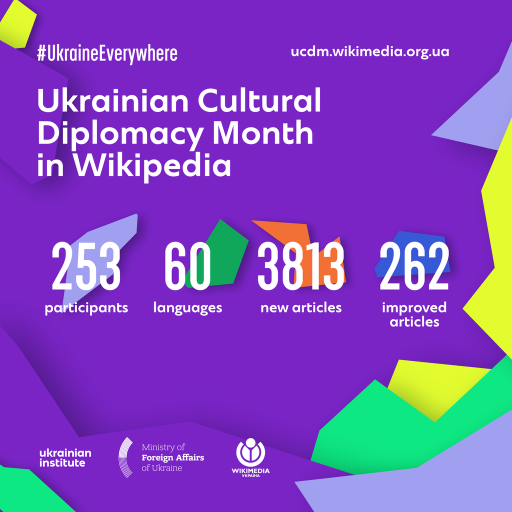In February-March 2022, for the second time the Ukraine’s Cultural Diplomacy Month took place across Wikimedia projects. It set the aim to create and improve articles about the culture and people of Ukraine in as many language editions of Wikipedia as possible. The detailed results of this campaign are described in this post.
Ukraine’s Cultural Diplomacy Month is an initiative dedicated to famous Ukrainian artists of cinema, music, literature, architecture, and design, who have made a significant contribution to world culture. It was jointly organized by Wikimedia Ukraine, the Ukrainian Institute and the Ministry of Foreign Affairs of Ukraine.
During the month of the campaign, 253 participants joined in. Twenty-nine of them took part in the marathon for the second time, while 224 joined for the first time this year.
In total, contesters wrote 3,813 new articles and improved 262 existing ones in 60 different language sections of Wikipedia. That’s five times more than last year. Among others, articles about Pavlo Tychyna in Arabic, Anna Yaroslavna in Finnish, a painting “Moonlit Night on the Dnieper” in Chinese, a dance “Hopak” in Persian, the Ukrainian avant-garde in German and a novel “Shadows of Forgotten Ancestors” in French were written.
Articles in unique languages in small language sections of Wikipedia have also appeared. The article about Ukraine was published in Nahuatl, about Kyiv in Tashelhit, Ahatanhel Krymsky in Central Bikol, Taras Shevchenko in Tagalog, and Yuriy Vynnychuk in Bashkir.
Several participants expressed their willingness to talk about their motivation to participate in the campaign:
I decided to participate in the contest, and thereby show my solidarity and support. In addition, the theme of the competition corresponds to my interests and hobbies. I’m not a Christian or a Catholic, I’m a Jewish woman. I have my own values criteria and, fortunately, they are far from mercantile standards. My whole being rebels against the destruction of people, cultural monuments and religious shrines in the territories of any countries. I believe that those, who destroyed their own orthodox shrines with their own hands or with their weapons (e.g.: as russian army’s orthodox christians destroyed orthodox christian church in Vyazovka) and other objects of cultural significance, have no future.
Wikipedian from Israel under nickname Tanzun
I just wanted to show the solidarity for brave Ukrainian citizens fighting for their autonomy, although I know our Wikipedia activities are powerless… tyrants, however, have been always afraid of the pen.
Wikipedian from Japan under nickname さえぼー
Ukraine has always fascinated me and I had done some articles on Ukraine for my local Wikipedia prior to this. A silver lining of all the cruelty committed in the ongoing war in Ukraine is that I got a chance to learn more about this lovely nation, and the nation really inspires me to visit her some day. To prepare myself for a future visit, I think learning more about her via translating various Ukraine-related articles on Wikipedia really aids me so. Hope to visit Ukraine one day, and take tonnes of pictures for Commons, too.
Wikipedian from Thailand under nickname Chainwit.
Thank you to everyone who, in such difficult times for Ukraine, joined the coverage of Ukrainian history and culture in different languages on Wikipedia!
The most active participants of Ukraine’s Cultural Diplomacy Month will soon receive certificates of participation and prizes from the organizers.

Can you help us translate this article?
In order for this article to reach as many people as possible we would like your help. Can you translate this article to get the message out?
Start translation
